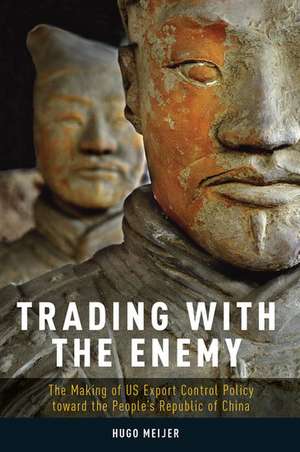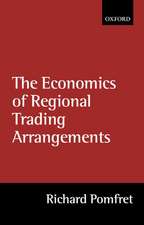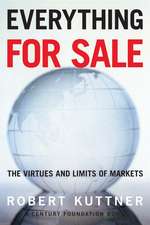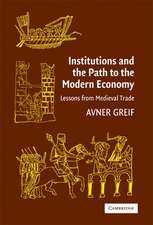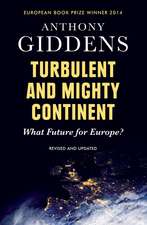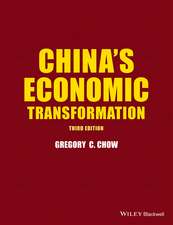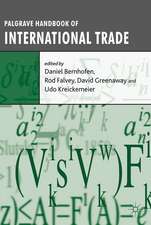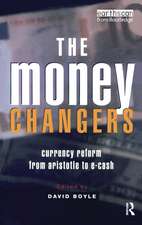Trading with the Enemy: The Making of US Export Control Policy toward the People's Republic of China
Autor Hugo Meijeren Limba Engleză Paperback – 10 mai 2018
| Toate formatele și edițiile | Preț | Express |
|---|---|---|
| Paperback (1) | 309.78 lei 31-37 zile | |
| Oxford University Press – 10 mai 2018 | 309.78 lei 31-37 zile | |
| Hardback (1) | 688.96 lei 31-37 zile | |
| Oxford University Press – 24 mar 2016 | 688.96 lei 31-37 zile |
Preț: 309.78 lei
Preț vechi: 350.52 lei
-12% Nou
Puncte Express: 465
Preț estimativ în valută:
59.27€ • 61.89$ • 49.06£
59.27€ • 61.89$ • 49.06£
Carte tipărită la comandă
Livrare economică 25-31 martie
Preluare comenzi: 021 569.72.76
Specificații
ISBN-13: 9780190889173
ISBN-10: 0190889179
Pagini: 416
Dimensiuni: 155 x 229 x 28 mm
Greutate: 0.59 kg
Editura: Oxford University Press
Colecția OUP USA
Locul publicării:New York, United States
ISBN-10: 0190889179
Pagini: 416
Dimensiuni: 155 x 229 x 28 mm
Greutate: 0.59 kg
Editura: Oxford University Press
Colecția OUP USA
Locul publicării:New York, United States
Recenzii
A fascinating sub-story of US-China relations. Despite all of the changes in the relationship, one constant over six-plus decades has been Washington's effort to restrict military-related technology transfers to China through its unilateral and multilateral export control regimes. Hugo Meijer's Trading with the Enemy offers a fine-grained historical accounting of this effort, which is of use to scholars and policymakers alike."
Based on new and unique primary source information, Hugo Meijer's Trading with the Enemy tells the important and heretofore untold story of US policy toward China on the export of arms and military-related technology from the Korean War to the present. This excellent and eminently readable work significantly contributes to our understanding of the shifting security and economic dynamics at play between the United States and China at a time when these dynamics are critical to global stability and prosperity." - Evan S. Medeiros, former U.S. National Security Council Senior Director for Asian Affairs
As geo-strategic and military competition grows between the United States and China, the greatest rivalry will take place in the strategic and dual-use high technology domain. Even as they contest for influence and dominance in the South China Sea and cyberspace, the overall race for global leadership will ultimately be decided in terms of technological innovation, industrial capacity, and economic sustainability. Hugo Meijer does a great service in shedding considerable light and providing analytical clarity in addressing this hugely complex issue. This is essential reading for anyone looking to understand the dynamics and long-term prospects for US-China strategic competition." - Tai Ming Cheung, University of California San Diego
During the Cold War, the United States made the sensible decision to restrict the export of advanced military technologies to its chief strategic rival, the Soviet Union. In contrast, U.S. high-tech firms now need access to large and growing markets in China in order to fund the research and development that keeps them at the cutting edge. Meijer charts an admirably clear path through the complexities of his subject to show how U.S. export control policy evolved over 30 years."
...an 'ambitious and comprehensive study of US export control policy toward the People's Republic of China Meijer's book is an impressive piece of scholarship that is both accessible and highly engaging Meijer does an outstanding job of leveraging the information and insights gained from his many high-level interviews in building his argument. His nuanced empirical analysis draws from declassified documents, government reports and public statements by various US officials, and - most importantly - nearly 200 interviews. The book will be of great interest to experts in the academic and policy communities who focus on US-China relations."
...Ultimately, Meijer's account of how growing economic interdependence in trade and finance potentially undermines the ability to utilize typical instruments of military and technological containment in the 21st century offers dynamic analysis of US foreign policy towards China. In highlighting the consequences of increasingly multifaceted security objectives amid the commercialization of military-related technology in global markets, Meijer provides a rich tapestry from which to understand the potential pitfalls for America's national security and its primacy in technology and innovation in a world accustomed to US dominance in these realms...Summing Up: Highly recommended. Graduate students and faculty.
Based on new and unique primary source information, Hugo Meijer's Trading with the Enemy tells the important and heretofore untold story of US policy toward China on the export of arms and military-related technology from the Korean War to the present. This excellent and eminently readable work significantly contributes to our understanding of the shifting security and economic dynamics at play between the United States and China at a time when these dynamics are critical to global stability and prosperity." - Evan S. Medeiros, former U.S. National Security Council Senior Director for Asian Affairs
As geo-strategic and military competition grows between the United States and China, the greatest rivalry will take place in the strategic and dual-use high technology domain. Even as they contest for influence and dominance in the South China Sea and cyberspace, the overall race for global leadership will ultimately be decided in terms of technological innovation, industrial capacity, and economic sustainability. Hugo Meijer does a great service in shedding considerable light and providing analytical clarity in addressing this hugely complex issue. This is essential reading for anyone looking to understand the dynamics and long-term prospects for US-China strategic competition." - Tai Ming Cheung, University of California San Diego
During the Cold War, the United States made the sensible decision to restrict the export of advanced military technologies to its chief strategic rival, the Soviet Union. In contrast, U.S. high-tech firms now need access to large and growing markets in China in order to fund the research and development that keeps them at the cutting edge. Meijer charts an admirably clear path through the complexities of his subject to show how U.S. export control policy evolved over 30 years."
...an 'ambitious and comprehensive study of US export control policy toward the People's Republic of China Meijer's book is an impressive piece of scholarship that is both accessible and highly engaging Meijer does an outstanding job of leveraging the information and insights gained from his many high-level interviews in building his argument. His nuanced empirical analysis draws from declassified documents, government reports and public statements by various US officials, and - most importantly - nearly 200 interviews. The book will be of great interest to experts in the academic and policy communities who focus on US-China relations."
...Ultimately, Meijer's account of how growing economic interdependence in trade and finance potentially undermines the ability to utilize typical instruments of military and technological containment in the 21st century offers dynamic analysis of US foreign policy towards China. In highlighting the consequences of increasingly multifaceted security objectives amid the commercialization of military-related technology in global markets, Meijer provides a rich tapestry from which to understand the potential pitfalls for America's national security and its primacy in technology and innovation in a world accustomed to US dominance in these realms...Summing Up: Highly recommended. Graduate students and faculty.
Notă biografică
Hugo Meijer is Marie Sklodowska-Curie Fellow at the European University Institute (EUI), Robert Schuman Centre for Advanced Studies. He is also the Academic Director of The European Initiative on Security Studies, a network of over sixty universities that share the goal of consolidating security studies in Europe. Previously, he was Lecturer in Defence Studies at King's College London (2013-2016) and a Researcher at the Institute for Strategic Research (IRSEM, Paris, 2016-2017). He received his PhD in International Relations from Sciences Po in 2013.
